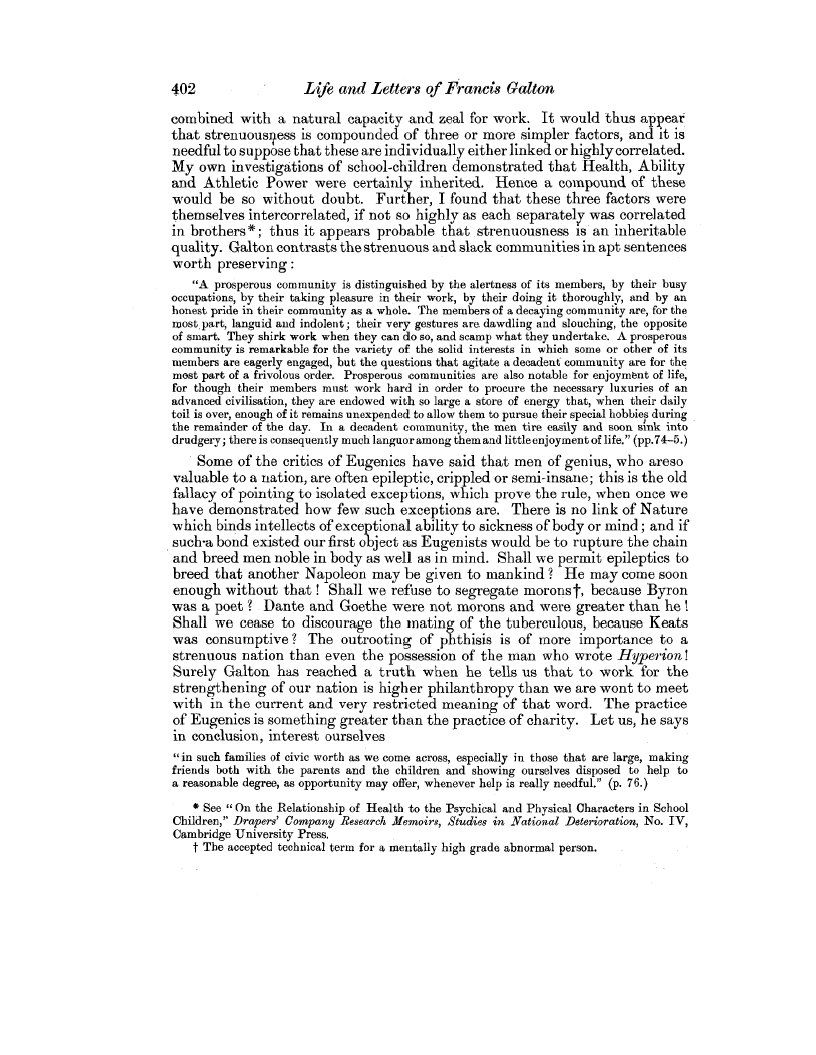| ||||||

OCR Rendition - approximate
402 Life and Letters of Francis Galton combined with a natural capacity and zeal for work. It would thus appear that strenuousness is compounded of three or more simpler factors, and it is needful to suppose that these are individually either linked or highly correlated. My own investigations of school-children demonstrated that Health, Ability and Athletic Power were certainly inherited. Hence a compound of these would be so without doubt. Further, I found that these three factors were themselves intercorrelated, if not so highly as each separately was correlated in brothers*; thus it appears probable that strenuousness is an inheritable quality. Galton contrasts the strenuous and slack communities in apt sentences worth preserving "A prosperous community is distinguished by the alertness of its members, by their busy occupations, by their taking pleasure in their work, by their doing it thoroughly, and by an honest pride in their community as a whole. The members of a decaying community are, for the most. part, languid and indolent; their very gestures are, dawdling and slouching, the opposite of smart. They shirk work when they can do so, and scamp what they undertake. A prosperous community is remarkable for the variety of the solid interests in which some or other of its members are eagerly engaged, but the questions that agitate a decadent community are for the most part of a frivolous order. Prosperous communities are also notable for enjoyment of life, for though their members must work hard in order to procure the necessary luxuries of an advanced civilisation, they are endowed with so large a store of energy that, when their daily toil is over, enough of it remains unexpended to allow them to pursue their special hobbies during the remainder of the day. In a decadent community, the men tire easily and soon sink into drudgery; there is consequently much languor among them and little enjoyment of life." (pp.74-5. ) Some of the critics of Eugenics have said that men of genius, who areso valuable to a nation, are often epileptic, crippled or semi-insane; this is the old fallacy of pointing to isolated exceptions, which prove the rule, when once we have demonstrated how few such exceptions are. There is no link of Nature which binds intellects of exceptional ability to sickness of body or mind ; and if such•a bond existed our first object as Eugenists would be to rupture the chain and breed men noble in body as well as in mind. Shall we permit epileptics to breed that another Napoleon maybe given to mankind? He may come soon enough without that ! Shall we refuse to segregate morons t, because Byron was a poet ? Dante and Goethe were not morons and were greater than he ! Shall we cease to discourage the mating of the tuberculous, because Keats was consumptive? The outrooting of phthisis is of more importance to a strenuous nation than even the possession of the man who wrote Hyperion ! Surely Galton has reached a truth when he tells us that to work for the strengthening of our nation is higher philanthropy than we are wont to meet with in the current and very restricted meaning of that word. The practice of Eugenics is something greater than the practice of charity. Let us, he says in conclusion, interest ourselves "in such families of civic worth as we come across, especially in those that are large, making friends both with the parents and the children and showing ourselves disposed to help to a reasonable degree, as opportunity may offer, whenever help is really needful." (p. 76.) * See " On the Relationship of Health to the Psychical and Physical Characters in School Children," Drapers' Company Research Memoirs, Studies in National Deterioration, No. IV, Cambridge University Press. t The accepted technical term for a mentally high grade abnormal person.
|